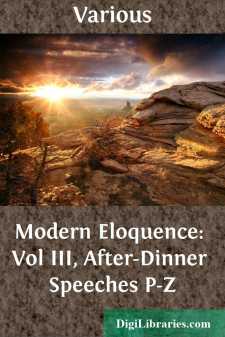Categories
- Antiques & Collectibles 13
- Architecture 36
- Art 48
- Bibles 22
- Biography & Autobiography 813
- Body, Mind & Spirit 142
- Business & Economics 28
- Children's Books 17
- Children's Fiction 14
- Computers 4
- Cooking 94
- Crafts & Hobbies 4
- Drama 346
- Education 46
- Family & Relationships 57
- Fiction 11829
- Games 19
- Gardening 17
- Health & Fitness 34
- History 1377
- House & Home 1
- Humor 147
- Juvenile Fiction 1873
- Juvenile Nonfiction 202
- Language Arts & Disciplines 88
- Law 16
- Literary Collections 686
- Literary Criticism 179
- Mathematics 13
- Medical 41
- Music 40
- Nature 179
- Non-Classifiable 1768
- Performing Arts 7
- Periodicals 1453
- Philosophy 64
- Photography 2
- Poetry 896
- Political Science 203
- Psychology 42
- Reference 154
- Religion 513
- Science 126
- Self-Help 84
- Social Science 81
- Sports & Recreation 34
- Study Aids 3
- Technology & Engineering 59
- Transportation 23
- Travel 463
- True Crime 29
Modern Eloquence: Vol III, After-Dinner Speeches P-Z
by: Various
Categories:
Description:
Excerpt
THOMAS NELSON PAGE
THE TORCH OF CIVILIZATION
[Speech of Thomas Nelson Page at the twentieth annual dinner of the New England Society in the City of Brooklyn, December 21, 1899. The President, Frederic A. Ward, said: "In these days of blessed amity, when there is no longer a united South or a disunited North, when the boundary of the North is the St. Lawrence and the boundary of the South the Rio Grande, and Mason and Dixon's Line is forever blotted from the map of our beloved country, and the nation has grown color-blind to blue and gray, it is with peculiar pleasure that we welcome here to-night a distinguished and typical representative of that noble people who live in that part of the present North that used to be called Dixie, of whom he has himself so beautifully and so truly said, 'If they bore themselves haughtily in their hour of triumph, they bore defeat with splendid fortitude. Their entire system crumbled and fell around them in ruins; they remained unmoved; they suffered the greatest humiliation of modern times; their slaves were put over them; they reconquered their section and preserved the civilization of the Anglo-Saxon.' It is not necessary, ladies and gentlemen, that I should introduce the next speaker to you, for I doubt not that you all belong to the multitude of mourners, who have wept real tears with black Sam and Miss Annie beside the coffin of Marse Chan; but I will call upon our friend, Thomas Nelson Page, to respond to the next toast, 'The Debt Each Part of the Country Owes the Other.'"]
Ladies and Gentlemen:—I did not remember that I had written anything as good as that which my friend has just quoted. It sounded to me, as he quoted it, very good indeed. At any rate, it is very true, and, perhaps, that it is true is the reason that you have done me the honor to invite me here to-night. I have been sitting for an hour in such a state of tremulousness and fright, facing this audience I was to address, that the ideas I had carefully gathered together have, I fear, rather taken flight; but I shall give them to you as they come, though they may not be in quite as good order as I should like them. The gift of after-dinner speaking is one I heard illustrated the other day very well at a dinner at which my friend, Judge Bartlett and I were present. A gentleman told a story of an English bishop travelling in a third-class railway carriage with an individual who was swearing most tremendously, originally, and picturesquely, till finally the bishop said to him: "My dear sir, where in the world did you learn to swear in that extraordinary manner?" And he said, "It can't be learned, it is a gift." After-dinner speaking is a gift I have often envied, ladies and gentlemen, and as I have not it I can only promise to tell you what I really think on the subject which I am here to speak about to-night.
I feel that in inviting me here as the representative of the South to speak on this occasion, I could not do you any better honor than to tell you precisely what I do think and what those, I in a manner represent, think; and I do not know that our views would differ very materially from yours....












